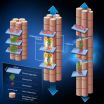(Press-News.org) ATLANTA - A potent chemotherapy agent wrapped within a monoclonal antibody selectively destroys the malignant cells responsible for acute lymphocytic leukemia (ALL) in either weekly or monthly dosing, researchers report at the 54th ASH Annual Meeting and Exposition.
This 'Trojan horse' assault on the cancer cells has significantly increased the response rate among patients with ALL, and now a clinical trial finds that weekly dosing works well and reduces side effects.
"The CD22 antigen is a specific marker for B-cell malignancies and is expressed in more than 90 percent of patients who have acute lymphocytic leukemia," said Susan O'Brien, M.D., professor in The University of Texas MD Anderson Department of Leukemia. "The antigen's specificity for B-cell cancers makes it a promising therapeutic target for intervention."
Bound to a potent toxin
The humanized antibody, known as inotuzumab ozogamicin, is attached to the toxin calicheamicin and binds to CD22. "After binding to the B cell, the antibody is internalized and the linker hydrolyzed, releasing the calicheamicin into only the malignant B cell," O'Brien said. "This enables us to bring in a very potent toxin that could not be given systemically and direct that toxin to the malignant B cell."
The experimental drug was first used in patients with B cell lymphoma. The main toxicity seen in the lymphoma trials was myelosuppression due primarily to deficiency of platelets.
"Myelosuppression is much less of an issue with acute leukemia, whether ALL or acute myelogenous leukemia, because you want to transiently wipe out the bone marrow to eradicate the leukemic cells," O'Brien said. "You expect to have myelosuppression as part of the therapy."
Toxicities manageable
For this study, the researchers used the dose defined as tolerable in the lymphoma trials-1.8 mg/m2-as a starting point.
"We observed very good activity in this relapse/refractory population and an overall response rate of 57 percent," O'Brien said. "The main toxicities were infusion reactions either during or shortly after infusion of the antibody. Patients developed fever sometimes associated with a drop in blood pressure. These were generally grade 1-2 so they were mild and easily treatable." The treatment was also associated with grade 1-2 elevations of transaminases, enzymes that reflect liver function, which had also occurred in the lymphoma trials.
Amended protocol
The researchers amended their protocol in an attempt to minimize toxicities. "We wondered whether we could reduce infusion reactions and liver function test elevations by giving the agent on a weekly basis instead of as a bolus every three to four weeks," O'Brien said. "The maximal plasma levels potentially would be lower, but the area under the curve might be the same because we would be giving the same total dose, just spread over three weeks."
Under the new protocol, the researchers gave the same total dose spread out over three weeks: .8 mg/m2 on Day 1 and .5 mg/m2 on Day 8 and Day 15. "We found exactly the same response rate with the weekly dose as with the monthly dose," O'Brien said. "But we did notice that the infusion reactions and the elevations in the transaminases were less frequent with the weekly schedule. This is probably because the side effects are most likely related to the peak concentrations of the drug, and when you spread it over three weeks the peak concentrations are not as high."
The Take-Away
"We observed impressive activity in a relapsed, refractory population," O'Brien said. "The toxicities were acceptable and were mainly grade 1-2 reactions to the drug itself, which is not uncommon because most antibodies are associated with mild infusion reactions. Transaminase elevations were predominately grade 1-2, and in the trial as a whole, fewer than five percent of the patients experienced grade 3-4 liver elevations."
O'Brien added that a new trial at MD Anderson is incorporating the antibody with low-dose chemotherapy as a frontline regimen for ALL in patients over age 65.
"One of the biggest complications in treating older patients with ALL is that the treatments cause myelosuppression, which makes patients more vulnerable to infection, and older patients are particularly susceptible to this and other complications," she said. "The idea is to take a very well-tolerated antibody and combine it with chemotherapy. That way we might not have to use full-dose chemo and can reduce side effects."
INFORMATION:
The clinical trial is funded by Pfizer, Inc., which developed inotuzumab.
Co-investigators with O'Brien are Deborah Thomas, M.D., Farhad Ravandi, M.D., Stefan Faderl, M.D., Jorge Cortes, M.D., Elias Jabbour, M.D., Hagop Kantarjian, M.D., Monica Kwari, B.S.N., Sergernne York, R.N., and Rebecca Garris, BSc, all of MD Anderson's Department of Leukemia; and Jeffrey Jorgensen, M.D., Ph.D., of MD Anderson's Department of Hemopathology; and Partow Kebriaei, M.D., of MD Anderson's Department of Stem Cell Transplantation and Cellular Therapy.
About MD Anderson
The University of Texas MD Anderson Cancer Center in Houston ranks as one of the world's most respected centers focused on cancer patient care, research, education and prevention. MD Anderson is one of only 41 comprehensive cancer centers designated by the National Cancer Institute. For nine of the past 11 years, including 2012, MD Anderson has ranked No. 1 in cancer care in "America's Best Hospitals," a survey published annually in U.S. News & World Report.
Weekly dose reduces targeted drug's side effects, but not its activity against ALL
2012-12-11
ELSE PRESS RELEASES FROM THIS DATE:
New system for aircraft forecasts potential storm hazards over oceans
2012-12-11
Contact: David Hosansky
hosansky@ucar.edu
303-497-8611
Zhenya Gallon, NCAR/UCAR Media Relations
zhenya@ucar.edu
303-497-8607
National Center for Atmospheric Research/University Corporation for Atmospheric Research
New system for aircraft forecasts potential storm hazards over oceans
BOULDER—The National Center for Atmospheric Research (NCAR) has developed a prototype system to help flights avoid major storms as they travel over remote ocean regions. The 8-hour forecasts of potentially dangerous atmospheric conditions are designed for pilots, air traffic ...
Does changing the price of medicine influence consumers' perceived health risk?
2012-12-11
Consumers assume their risk of getting a serious illness is higher when medications are cheaper because they believe that prices for life-saving products are based on need and not profit, according to a new study in the Journal of Consumer Research.
"When consumers see lower prices for a life-saving product, they infer a higher need and thereby a greater risk that they can contract the disease. On the other hand, higher prices signal that a drug or treatment is inaccessible and thus the risk of getting a disease must not be all that great," write authors Adriana Samper ...
Eating or spending too much? Blame it on Facebook
2012-12-11
Participating in online social networks can have a detrimental effect on consumer well-being by lowering self-control among certain users, according to a new study in the Journal of Consumer Research.
"Using online social networks can have a positive effect on self-esteem and well-being. However, these increased feelings of self-worth can have a detrimental effect on behavior. Because consumers care about the image they present to close friends, social network use enhances self-esteem in users who are focused on close friends while browsing their social network. This ...
Who are you calling old? How elderly consumers negotiate their identities
2012-12-11
Caregivers view elderly consumers as "old" when they can no longer perform everyday consumption activities on their own regardless of their actual age, according to a new study in the Journal of Consumer Research.
"Consumption activities such as shopping, preparing meals, doing housework, going to the doctor, taking medications, and managing money serve as a means of identifying someone as old and a venue for working through conflicts that arise when older consumers who do not identify as old are treated as an 'old person' by family members and service providers," write ...
The current state of lung cancer treatment
2012-12-11
A review in the December issue of the journal Archives of Pathology & Laboratory Medicine by Paul Bunn Jr, MD, University of Colorado Cancer Center investigator and past president of ASCO, IASLC and AACI describes the current state of lung cancer care.
"We're in a new paradigm in which we realize this top cause of cancer deaths is actually a number of related diseases, each potentially with its own cause and cure," Bunn says.
The review describes the shift from blanketing lung cancer with radiation and chemotherapy, to targeting the specific genetic mutations that cause ...
Battling brittle bones... with broccoli and spinach?
2012-12-11
Troy, N.Y. – A new study from engineering researchers at Rensselaer Polytechnic Institute shows, for the first time, how the little-understood protein osteocalcin plays a significant role in the strength of our bones. The findings could lead to new strategies and therapeutics for fighting osteoporosis and lowering the risk of bone fracture.
Funded by the U.S. National Institutes of Health, the study details how fractures in healthy bones begin with the creation of incredibly tiny holes, each measuring only about 500 atoms in diameter, within the bone's mineral structure. ...
Reports assess global student achievement in math, science and reading literacy
2012-12-11
CHESTNUT HILL, Mass. (12-11-12)—Students from East Asian countries, in addition to a select group of European countries, outperformed students around the world in mathematics, science and reading at both the fourth and eighth grades, according to results released Dec. 11 by Lynch School of Education Professors Ina V.S. Mullis and Michael O. Martin, executive directors of the TIMSS & PIRLS International Study Center.
The Trends in International Mathematics and Science Study (TIMSS) is the first global assessment of mathematics and science to provide data about trends over ...
Holiday shopping madness: When do consumers seek to punish fellow shoppers for behaving badly?
2012-12-11
Consumers seek to punish fellow consumers who violate social norms while shopping but also make exceptions depending on the situation, according to a new study in the Journal of Consumer Research.
"Punishment is a complex decision for consumers to make as it is difficult to punish someone but also difficult to look the other way. Consumers do not seem to make these decisions lightly, and a number of interesting factors influence consumer punishment decisions," write authors Lily Lin, Darren W. Dahl (both University of British Columbia), and Jennifer J. Argo (University ...
How do stay-at-home dads seek greater social acceptance?
2012-12-11
In order to avoid the stigma and loss of status posed by their lifestyle choice, stay-at-home fathers are mobilizing to build greater legitimacy for their marginalized gender identity, according to a new study in the Journal of Consumer Research.
"Stay-at-home fathers aggressively pursue recognition by and acceptance from mainstream institutions, with a particular emphasis on the mass market and iconic household and family-oriented brands. Accordingly, they vigilantly watch for mass media representations and advertisements that positively acknowledge their collective ...
Need to move soon? Don't trust your emotions
2012-12-11
Consumers are more likely to make emotional instead of objective assessments when the outcomes are closer to the present time than when they are further away in the future, according to a new study in the Journal of Consumer Research.
"The proximity of a decision's outcome increases consumer reliance on feelings when making decisions. Feelings are relied upon more when the outcome is closer in time because these feelings appear to be more informative in such situations," write authors Hannah H. Chang (Singapore Management University) and Michel Tuan Pham (Columbia University).
From ...



